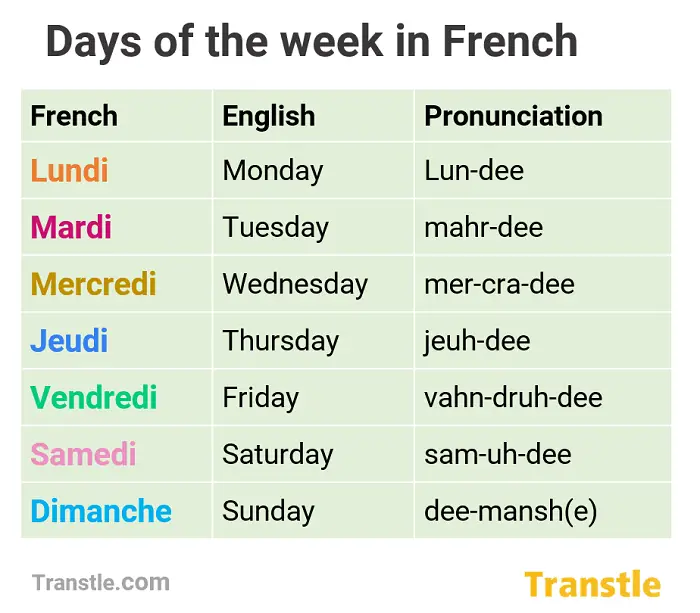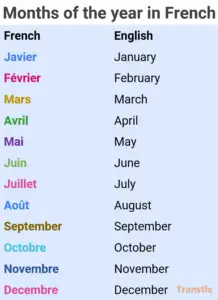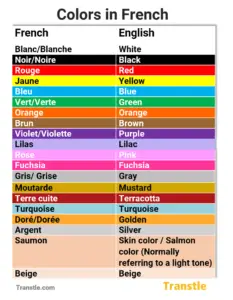Days of the Week in French With Examples and Pronunciation

The days of the week in French are basic words and sources of everyday vocabulary. Knowledge is essential for developing the language. There are 7 days in the week, and in French, these are: lundi, mardi, mercredi, jeudi, vendredi, samedi, dimanche.
In addition to learning the vocabulary, it’s important to understand the grammatical rules associated with these days, such as the correct use of articles and prepositions.
Days of the Week in French
| French Day | English Equivalent | Pronunciation |
| Lundi | Monday | luhn-DEE |
| Mardi | Tuesday | mar-DEE |
| Mercredi | Wednesday | mehr-kruh-DEE |
| Jeudi | Thursday | zhuh-DEE |
| Vendredi | Friday | vahn-druh-DEE |
| Samedi | Saturday | sam-DEE |
| Dimanche | Sunday | dee-MAHN-sh |
| French | English |
| Jour (m) | Day |
| Semaine (f) | Week |
| Jours de la semaine | Weekdays |
| Date (f) | Date |
See also: Months of the year in French
Key Grammatical Rules
Using the days of the week correctly in French is simple if you remember these essential rules.
- Lowercase Usage: Unlike in English, the days of the week in French are always written in lowercase, unless they begin a sentence.
|
The Article “le”: This is a key difference from English. You use the definite article “le” before a day of the week to say “on [day]” for a specific event or a habitual action.
|
Saying “It Is”: To state what day it is, you simply use “C’est” followed by the day.
|
Important Note: The definite article “le” is also commonly used with other general time expressions:
- Le matin – In the morning / Every morning
- Le soir – In the evening / Every evening
- Le week-end – On the weekend / Every weekend
Other Common Time Expressions
| French | English |
| Week-end (m) | Weekend |
| Aujourd’hui | Today |
| Demain | Tomorrow |
| Après demain | Day after tomorrow |
| Avant-hier | The day before yesterday |
| Le jour suivant | The next day |
| Le jour d’avant | The previous day |
| Le dernier jour | The last day |
| Matin (m) | Morning |
| Midi (m) | Noon |
| Nuit (f) | Evening |
| Minuit (m) | Midnight |
Examples in sentences
Here are various sentences showcasing the days of the week and related time expressions in practical use:
|
Common Mistakes to Avoid
Being aware of these frequent errors will help you use the days of the week like a native speaker:
- Capitalization: Always remember to use lowercase for the days of the week in French. Capitalizing them is a common beginner’s mistake influenced by English.
- Omitting “Le”: For “on [day]s” or when referring to a specific day, remember to include the definite article “le.” Directly translating “on Monday” as “sur lundi” is incorrect.
- Gender Confusion: Days of the week are always masculine. Do not use “la” or “les” in singular contexts (e.g., “la lundi” is incorrect).
- Incorrect Prepositions: French uses “le” (or no preposition for “today,” “tomorrow”) where English uses “on.” Avoid literal translations like “sur lundi.”
Quiz and exercises
Here are some sample quiz questions and exercises for you to practice what you learned.
Quiz
- What is the French word for “Sunday”?
- How are the days of the week written in French?
- Do the days of the week in French begin with a capital letter?
- How do you say “It’s Wednesday” in French?
- What definite article is used before the days of the week in French?
Exercise
Translate the following sentences from English to French, using the days of the week provided:
- Today is Monday.
- The meeting is on Thursday.
- I have a class on Wednesday.
- We’re going out on Saturday.
- I don’t work on Sundays.
Answers
Quiz
- “Dimanche”
- The days of the week in French are: Lundi, Mardi, Mercredi, Jeudi, Vendredi, Samedi, and Dimanche.
- No, the days of the week in French are written in lowercase.
- “C’est mercredi.”
- The definite article “Le” is used before the days of the week in French.
Exercise
- Aujourd’hui, c’est lundi.
- La réunion est le jeudi.
- J’ai un cours le mercredi.
- Nous sortons le samedi.
- Je ne travaille pas le dimanche.
Read next

Months of the Year in French: List & Pronunciation
The months of the year in French with pronunciation, grammar rules, sentences and examples. Learn them today!

Colors in French: Complete List and Pronunciation
Learn colors in French! Complete list of colors in French with pictures, sentences, and pronunciation.

French Subject Pronouns: A Complete Guide, Examples, Exercises
French personal pronouns (in English I, you, he/she, we, they, etc.) reflect the subject of the sentence.